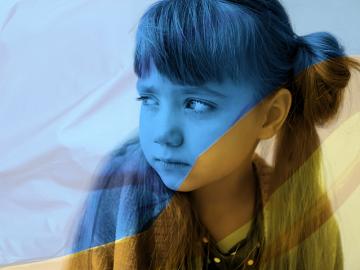FRA’s third bulletin on ‘The Russian war of aggression against Ukraine’ examines how best to protect the fundamental rights of children now in the EU that fled the war in Ukraine. It also identifies the steps some countries have taken.
Furthermore, it highlights various areas of concern like keeping track of children, access to education and mental healthcare, as well as the situation of children who were evacuated from Ukrainian institutions.
The EU’s Temporary Protection Directive entitles all those who came to the EU from Ukraine to settle and integrate here. It has specific provisions to protect children, such as the provision of medical or other necessary assistance to unaccompanied children or the right to education under the same conditions as national children.
To better protect children, the bulletin identifies key areas that need addressing:
- Avoiding further loss of education - the war has disrupted the education of many children who risk falling even further behind in their schooling. In addition, many schools struggle to include additional pupils from Ukraine. Intensive language and classes aim to facilitate integration in local schools.
- Offering healthcare and counselling – many children have been traumatised by the war. Healthcare and social welfare are provided but available services vary, especially in Member States where national systems were already struggling. Language and the lack of mental health support also complicate matters.
- Protecting unaccompanied and separated children - Some Member States created specialist teams to better support unaccompanied children from Ukraine. Ukrainian embassies supported in the recognition of Ukrainian guardianship documents. However, pre-existing challenges in legal guardianship for unaccompanied asylum-seeking children remain.
- Promoting the deinstitutionalisation of children - Children evacuated from Ukrainian institutions were often housed in large or inadequate facilities. The EU should continue to promote community-based, individualised care for children. Child protection authorities should help protect these children.
- Supporting children with disabilities - challenges in accepting disability papers from Ukraine limited the support children with disabilities receive. Some Member States developed targeted support programmes. Member States need to pay particular attention to ensuring the specific needs for accessibility, inclusion and additional support are met.
- Registering children - some Member States lack comprehensive data about how many children from Ukraine are in their country. Authorities also take different approaches to registering children. This hampers efforts to developed effective and targeted support.
As discussions continue about the future of Ukraine, the EU and its Member States should pay particular attention to the needs of children and what ultimately is in their best interests to safeguard their fundamental rights and wellbeing.
Quote of FRA Director Michael O’Flaherty:
"Many of these children live in perpetual uncertainty. In their short lives, they have borne witness to a global pandemic, the violent invasion of their country, and a journey to a new country. They have been separated from family members, have had to learn a new language, understand a new culture, and make new friends, all the while not knowing how long this precarious chapter will last. The way forward must be one anchored in existing EU and international law, which binds us all."
